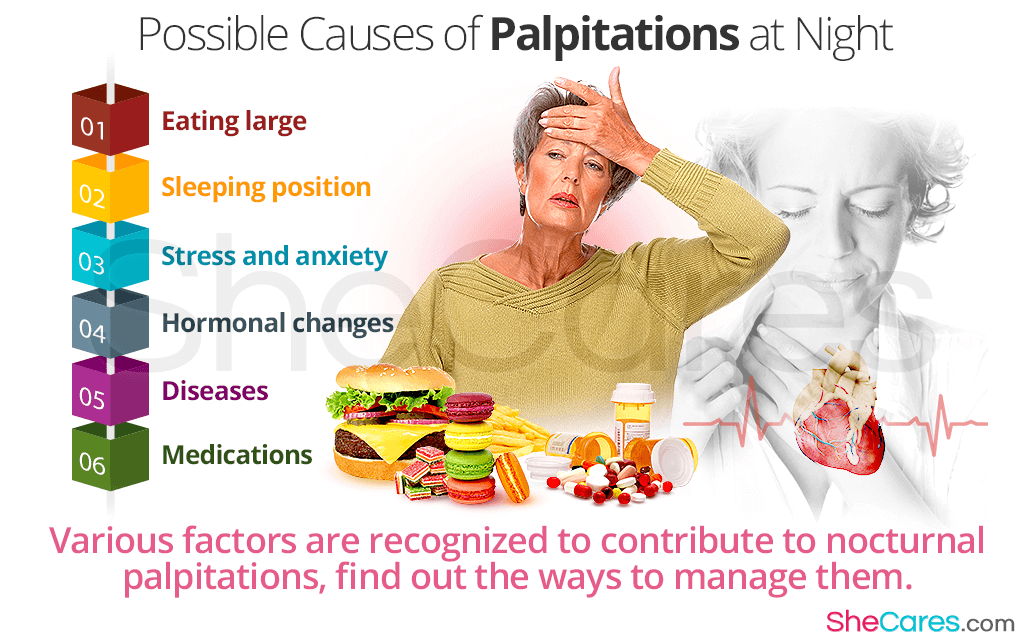Palpitations can be very scary for the first time sufferers, and when they wake you up in in the middle of the night, they are understandably a source of anxiety. Though unpleasant and worrisome, they are common among women and usually do not relate to serious health issues. Keep reading about nocturnal palpitations and the ways to manage them.
About Irregular Heartbeat at Night
It is very unlikely that palpitations, defined as a heart rate outside the 60-100 beats per minute range, occur only at night without any episodes during the day. Usually their frequency is similar during daytime and nighttime hours.
However, most women do not realize that, because they are typically more active in the day. At night, when the noises and distractions are quieter, it is much easier to be suddenly aware of any deviations from the regular heartbeat.
Possible Causes of Palpitations at Night
Although there are no known medical conditions that cause irregular heartbeat solely at night, various factors are recognized to contribute to nocturnal palpitations. They include:
Eating large or unhealthy meals before going to sleep is a common cause for palpitations at night. It can also cause nightmares, which can increase the heart rate. Caffeine, cigarettes, or strenuous exercise right before going to bed can overstimulate the body and result in irregular heartbeat.
Sleeping position, particularly sleeping on the left side, where the heart is located, or on the back can compress the vague nerve, which plays a role in controlling the heart rate. This compression triggers sudden palpitations.
Stress and anxiety contribute to nocturnal palpitations. At night, when our defenses fall down, we become more vulnerable to worrying and over-analyzing.
Hormonal changes, associated with menstruation, pregnancy, and menopause, are known to cause an irregular heartbeat, both in the day and at night.
Diseases, such as hyperthyroidism, anemia, dehydration, fever, low blood pressure, and low blood sugar, as well as many cardiac illnesses trigger daily and nocturnal palpitations.
Medications, especially those for cold, hyperthyroidism, diet, and asthma, often list irregular heartbeat in their side effects, especially if they are taken at bedtime.
Management of Palpitations at Night
To do it: pinch your nose and close your mouth, then exhale for 15 seconds. This forceful blowing will raise pressure in the chest, stimulate the vagus nerve, and stabilize the heart rate.
The management of night palpitations is not always easy. Various lifestyle changes and practices are not always effective, so you should find one that works for you. These suggestions can help you cope with a rapid heartbeat at night:
Avoid the known triggers
Change your sleeping positions, eat the last meal and stay away from cigarettes and caffeine three hours before bedtime. Discover your optimal way to manage stress, like finding a hobby or spending time with friends and family.
Develop heart-healthy habits
Such as drinking enough water, composing your diet with Omega-3 fatty acids, CoQ10, monounsaturated fats, and polyphenol anti-oxidants, and increasing your physical activity can help you quiet your mind and get a good night sleep.
Manage other health issues
Fear and uncertainty about your health situation can be big triggers of nocturnal palpitations, so you should give relaxation techniques, such as yoga and meditation, a try.
Should I Be Worried?
Although palpitations are generally non-life-threatening, it is important to undergo a full physical check-up to ensure there are no underlying medical conditions triggering them. If you also experience chest pain or pressure along with palpitations, immediately go to the emergency room as it might be a sign of a heart attack.
If you are concerned that the episodes occur mostly at night when your doctor cannot examine you, you can have a small portable device, called Holter monitor, placed on your chest, which will record your heartbeat for 24-48 hours. This will give your doctor more insights into the patterns of your irregular heartbeat.
Night palpitations are a nuisance, but they happen to all women throughout their lives. Sometimes they are a temporary occurrence due to physiological changes in your body, other times they have to be dealt with long-term, but living with night palpitations and using effective management techniques can still enable you to have a peaceful life.

